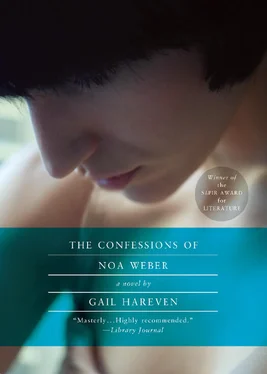He looked down at me and then he lay down next to me again. He allowed me to crease his shirt in silence a little longer, but he didn’t let me off completely. “Your friend, Miriam, who moved to Ma’ale Adumim, why don’t you ask her what she thinks of Begin? Or do you also prefer for the people to keep quiet?” I didn’t have to ask Miriam because I already knew. “Miriam isn’t an example, in many senses she’s even more left-wing than I am, but she has her own personal story, her own private score to settle for what happened to her when she arrived in the country.” “And the left doesn’t have, right? They don’t have private scores to settle, and that’s why they’re the only ones who know how to understand history and how to make progress. What a pity that there are people like your friend Miriam who get in the way of historical progress.”
ON THE BRINK
This is the phrase that comes to mind because that’s how it felt then, as if I was teetering on the brink, and sometimes I stumbled. With three or four hours of sleep at night, giddy and aroused to the point of being unable to concentrate, there were moments when objects seemed to lose their solidity, and then I would stumble, and bruised toes and cut fingers were quite a common occurrence then. I would linger with Hagar for a long time on the curb before crossing the street, afraid that I wasn’t assessing distance and speed correctly.
Strange how you get accustomed to walking on shifting ground, too. Absorbed in mapping my own inner swamps, I was careful not to arouse suspicion, I adapted my movements to my loosening grip on reality, and the only attention I provoked was of the “you look tired” variety. In a certain sense everything became easier, because nothing seemed completely real except for the hours I spent with Alek — closing the door with a backwards kick, trapping my eyes as I stepped back, not letting them go as he came closer, and when I expected his quick, hard movement, touching me rather with a slow, long one.
When everything becomes a little abstract, the concrete stops resisting you, and movements grow lighter, like those of an astronaut in space. During the weeks when he disappeared I would make up for lost sleep, and somehow or other I must have been born lucky, because even when the phenylethylamine rioted through my brain, my memory went on functioning like a separate disk.
As the end of my last year in the law faculty approached, it was clear that I wasn’t a candidate for internship, that no legal firm I knew would take on a single mother as an intern — in those days I don’t think the term “single mother” was yet in use — and even if someone would have accepted me, I wouldn’t have been able to organize myself to cope with twelve- and fourteen-hour workdays. A few of the women graduates applied to be prosecutors for similar reasons, but I looked for a way out. Armed with a self-confidence that was paradoxically nourished by my new sexual exploits and the dramatic externalization of my sexual vulnerability, and under Alek’s imaginary eyes, which turned every test into a trifle and at the same time also challenged me to win, I went to be interviewed for a job with a human rights foundation. They weren’t necessarily looking for a lawyer, but legal articulateness and articulateness in general was seen as an advantage, and in the end I impressed them to such an extent that they agreed to keep the job for me and wait for almost two months until I graduated. I worked for the fund for over sixteen years, from the days when a staff of five were crowded in a noisy little office on Aza Street, until 1996 when it had grown into an empire, with a magnificent house in Talbiyeh and professional departments. According to the mandate defined by our donors we were supposed to assist in the development of local organizations dealing with the rights of … only such organizations barely existed then. I have had a number of occasions to say that most of the upheavals undergone by Israeli society from the end of the seventies to today can be described by the growth of such bodies, but what is relevant here is that the work consumed me to an extent that I never imagined, and that everything I learned during its course about the reality underneath the reality became a part of my being.
In the beginning I made all the mistakes usually made by beginners. All of us except for Jeff were new at the job, and Jeffrey’s American experience didn’t suit the situation in Israel. We wasted months enthusiastically and inefficiently monitoring the activities of the so-called “Green Patrol” in their harassment of the Bedouins. At the height of these futile endeavours I found myself driving round the Negev with Yossi Lenk in the vain attempt to identify a stolen herd, as well as conducting furious and no less futile telephone conversations with my father’s friends, who naturally denied all knowledge of what I was telling them.
Months were wasted in vain attempts to organize the residents of what was once the picturesque slum of Yemin Moshe, all with the aim of obtaining legal representation for these people who had been evicted from their homes when it was decided to gentrify the neighborhood and turn it into a tourist attraction. During the razing of the Shama’a Quarter to make room for the Cinematheque we compiled a thick dossier, which we didn’t know what to do with, and our initial contacts with a few doctors in the Gaza Strip were abruptly broken off, for reasons we were unable to understand. We also had no firm policy at that stage as to whether the occupied territories were part of our mandate or not.
In internal seminars held by the fund I am sometimes called upon to tell anecdotes from those pioneering days: before the era of directors and research assistants, of nonprofit associations and volunteers and organizational consultants, of project descriptions and project funding and spreadsheets, when goals were not yet printed on recycled paper and human suffering was not yet parceled out among us in groups. As greenhorns we let the experiences swallow us up, let them make demands on our time without consideration of working hours, and this was exactly what I needed. I met people, I spoke to people, I traveled to places, the phone began to ring a lot, I made a lot of phone calls myself, and for a change I was doing something that seemed important to me.
The year that I left the fund, when I held down two-thirds of a full-time job and was in charge of a number of well-formulated projects, it happened that I removed a young woman from dealing with damaged children. We were in the car on our way back from Haifa, after visiting one of the hostels whose financing the fund was then investigating, and this young woman, whose name was also Noa, told us how after previous visits to similar institutions she had woken at up night with horrible nightmares and gone to sleep with her daughter. “The strangest thing,” she said, “is that after not being able to tear myself away from her all night, after lying next to her and praying to God that nothing terrible happens to her, as soon as she wakes up I haven’t got any patience for her. She’s a little slow in the morning, she always dawdles in the morning, it’s nothing new, but precisely on this morning, I don’t know why, I lost my temper and behaved like a monster.”
“If that’s the situation, it’s a sign that the job isn’t for you,” I pronounced from the front seat. “It doesn’t help you and it doesn’t help the work for you to get into trouble at home.” And the next day, in spite of her objections, she was transferred to working with groups assisting foreign workers.
I was never in danger of over-identification. Suffering, wickedness, stupidity, injustice, cruelty — I learned things about reality that I could never have imagined, but the main feeling simmering inside me was anger, which didn’t always explode in the right place, and not always in a helpful way. My father was often an object of my anger, especially in the first years, as if he, as a representative of the “oligarchy,” was responsible for Israeli reality and could be called on to account for it.
Читать дальше












